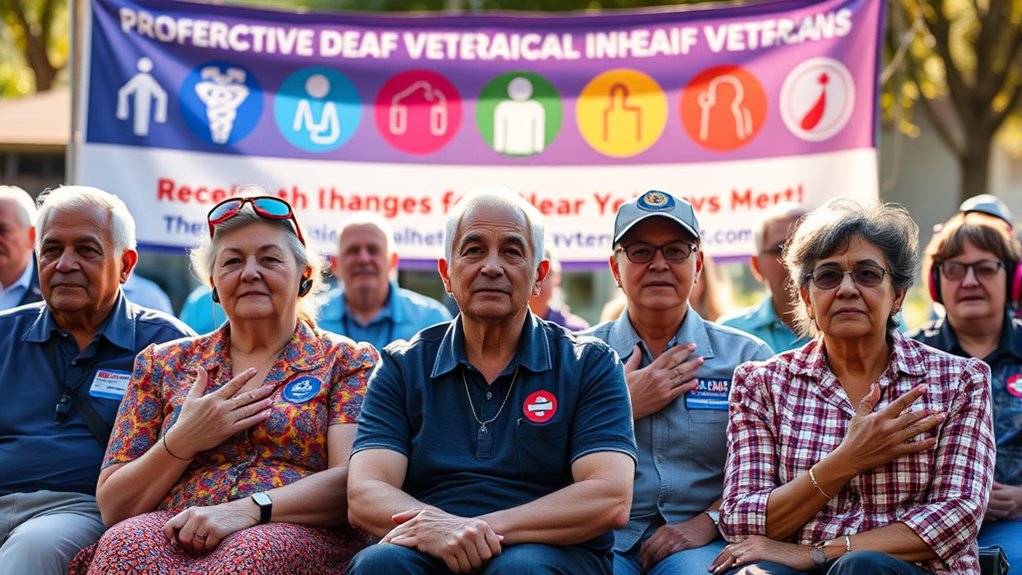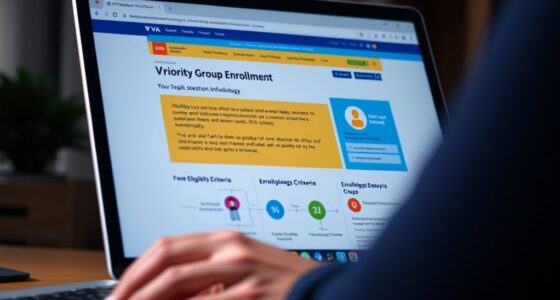VA presumptive policies make it easier for you to access benefits if you have hearing conditions linked to your military service. Recent updates broaden coverage, recognize hearing loss and assistive devices, and streamline claims by reducing proof requirements. Clear policies help you establish service connection and get benefits faster. However, communication challenges can still create barriers. If you explore further, you’ll discover ways to maximize your benefits and get the support you deserve.
Key Takeaways
- Presumptive policies simplify claiming benefits by automatically linking certain hearing conditions to military service for deaf veterans.
- Recent updates expand coverage, recognizing more hearing loss conditions and assistive technologies, improving access for deaf veterans.
- These policies reduce proof requirements, making it easier for deaf veterans to establish service connection and receive compensation.
- Clearer criteria and automation streamline the benefits process, minimizing delays and denials for deaf veterans.
- Communication accommodations and outreach are essential to help deaf veterans navigate and access presumptive benefits effectively.
Top picks for "presumptive policy affect"
Open Amazon search results for this keyword.
As an affiliate, we earn on qualifying purchases.
Understanding VA Presumptive Policies and Their Purpose

VA presumptive policies are designed to streamline benefits for veterans whose health conditions are linked to their military service. These policies make it easier to qualify for disability compensation without extensive medical evaluations, saving you time and effort. By establishing specific conditions as presumptive, the VA automatically considers them connected to your service, reducing the need for detailed proof. Legal considerations come into play, as these policies ensure your rights are protected and that you receive the benefits you’re entitled to. Understanding how presumptive conditions work helps you navigate the claims process more confidently. This approach aims to recognize common service-related health issues quickly, so you can access the support you need without unnecessary delays or legal hurdles. Additionally, health conditions like certain respiratory issues or hearing loss can be automatically linked to service, simplifying the claims process further.
Key Changes in Presumptive Criteria Affecting Deaf Veterans

Recent changes now include more hearing loss conditions under presumptive coverage, which could benefit many deaf veterans. Clarified links between military service and hearing issues help strengthen your claims. Understanding these updates is vital for ensuring you receive the benefits you’re entitled to. Incorporating data analysis by AI can further assist in verifying your eligibility and supporting your claims.
Expanded Hearing Loss Conditions
Have you noticed how the criteria for service-connected hearing loss have expanded to include more conditions? This change means more deaf veterans can qualify for benefits without needing to prove the direct link to military service. The VA now recognizes a broader range of hearing impairments, which can involve assistive technology to improve daily communication. These updates help reduce communication barriers, making it easier for veterans to access resources and support. By broadening the scope of conditions, the VA acknowledges that hearing loss isn’t always straightforward. If you experience additional or complex hearing issues, this expansion could positively impact your eligibility and ensure you receive the benefits you deserve, especially if traditional hearing tests don’t fully capture your condition.
Military Service Link Clarifications
While the criteria for establishing service connection have become more flexible, some veterans still face challenges proving their hearing loss is directly linked to military service. Clarifications in military service links now emphasize specific factors, such as:
- The timing of hearing loss onset relative to service periods.
- The presence of documented exposure to noise hazards during deployment.
- Corroborating medical evidence linking hearing issues to military activities.
- The use of specialized hearing devices that support veterans with service-related hearing impairments.
These updates can impact your ability to access veteran employment opportunities and mental health support, especially if hearing loss affects daily functioning. Understanding these clarifications helps you navigate claims more effectively, ensuring your service-connected needs are recognized. Clearer links also support your overall well-being, making it easier to secure resources that improve quality of life and facilitate reintegration into civilian roles.
How Eligibility for Benefits Is Determined for Deaf Veterans

When determining your eligibility for benefits, the VA reviews specific medical evidence and service records. They also consider whether your condition meets the service connection criteria and if it matches any listed presumptive conditions. Additionally, understanding emotional support options and resources can be beneficial in the overall process.
Medical Evidence Requirements
Determining eligibility for benefits as a deaf veteran relies heavily on medical evidence that verifies the existence and connection of your hearing loss or deafness to military service. Your medical documentation must clearly demonstrate the severity of your condition and its relation to your service. To strengthen your evidence submission, ensure you include:
- Detailed audiological reports documenting hearing loss levels,
- Medical records indicating diagnosis and treatment history,
- Statements from healthcare providers linking your condition to your military duties,
- Incorporating automation technologies can help streamline the collection and organization of your medical records to ensure completeness and accuracy.
Accurate and thorough evidence supports your claim and helps establish service connection. Make sure your medical documentation is current and complete, as incomplete evidence can delay approval. Presenting solid evidence is vital for a successful benefits determination.
Service Connection Criteria
Establishing service connection for deaf veterans involves showing that your hearing loss or deafness is directly linked to your military service. You’ll need medical evaluations that document your condition and connect it to your time in service. These evaluations help determine the severity of your hearing loss, which influences your disability ratings. The VA considers whether your hearing impairment is service-related based on medical evidence, including audiological tests and expert opinions. A higher disability rating reflects a more severe impairment, affecting your benefits amount. Keep in mind that establishing service connection requires clear evidence that your condition originated during or was caused by your military service. Proper medical evaluations are essential to meet the criteria and successfully secure your benefits. Additionally, understanding sound exposure risks during service can help support your claim.
Presumptive Condition Lists
Did you know that the VA maintains a list of conditions that are automatically presumed to be related to military service? This Presumptive Condition List simplifies eligibility for benefits, especially for deaf veterans. Policy implementation guarantees that qualifying conditions are recognized without extensive evidence. To navigate this process effectively, you should understand that:
- Conditions like sudden hearing loss or tinnitus are automatically linked to service if they appear within a specified timeframe.
- Deaf veterans may also qualify if their hearing impairment is diagnosed after service, based on certain criteria.
- Veteran advocacy groups work to expand this list, ensuring more conditions related to service are recognized, supporting fair benefits.
- Understanding presumptive policies can help veterans and their families better navigate the claims process and access the benefits they deserve. This list streamlines claims and promotes equitable policy application, emphasizing the importance of clear criteria for deaf veterans seeking support.
Challenges Faced by Deaf Veterans in Accessing Presumptive Benefits

Deaf veterans often encounter significant barriers when trying to access presumptive benefits through the VA. Communication challenges can hinder understanding of eligibility requirements and the application process. Without effective communication accommodations, you might miss critical information or misunderstand instructions. Assistive technology, such as captioned videos or sign language interpreters, can help, but access isn’t always consistent. Community support plays a crucial role, as local advocacy groups and veteran organizations can guide you through complex procedures. Despite these resources, steering through the VA’s system remains difficult, especially if you lack awareness of available tools. Overcoming these challenges requires persistence and support, ensuring you don’t face unnecessary delays or denials in receiving the benefits you deserve.
The Role of Communication Accommodations in Benefit Claims

Effective communication accommodations are essential in ensuring that your benefit claims are accurately understood and processed by the VA. Assistive technology, such as speech-to-text devices or video relay services, helps bridge communication gaps. Using effective communication strategies, like clear, concise language and visual aids, can prevent misunderstandings. To improve your claim process, consider:
- Providing detailed documentation of your communication needs.
- Requesting specific assistive technology tools that suit your disability.
- Working closely with VA representatives trained in communication strategies for deaf veterans.
- Being aware that juice detox benefits can sometimes be impacted by communication barriers, emphasizing the importance of clear exchanges.
These steps ensure your concerns are properly conveyed, reducing errors or delays. Communication accommodations not only improve clarity but also empower you to participate actively in your claim process. Your proactive approach can make a significant difference in securing the benefits you deserve.
Opportunities Created by Recent Policy Updates for Deaf Veterans

Recent policy updates have opened new opportunities for deaf veterans to access benefits more efficiently and equitably. One key development is the increased emphasis on assistive technologies, which help overcome communication barriers during claims processes and medical evaluations. These tools, such as real-time captioning and video relay services, ensure your needs are understood and accurately documented. Additionally, the VA has expanded community outreach efforts to connect deaf veterans with resources and support networks. By participating in these outreach initiatives, you can stay informed about your benefits and navigate the system more confidently. These updates aim to streamline access and reduce disparities, empowering you to receive the care and support you deserve. Overall, recent policies foster a more inclusive environment for deaf veterans seeking benefits. Understanding how auras reflect emotional and spiritual states can also help in personal development and emotional well-being, which supports a holistic approach to health and recovery.
Strategies for Deaf Veterans to Maximize Benefits Under New Presumptive Rules

To make the most of the new presumptive rules, you should first stay informed about the specific conditions now recognized for deaf veterans. Next, leverage assistive technology to document and communicate your needs effectively. Additionally, engaging in community outreach can connect you with support networks. Here are key strategies:
- Keep detailed records of your medical history and symptoms related to deafness and related conditions.
- Use assistive technology tools like hearing aids or communication devices to support your claims and daily life.
- Connect with veteran organizations and local outreach programs to stay updated on policy changes and available resources.
Frequently Asked Questions
How Do VA Presumptive Policies Specifically Address Deaf Veterans’ Needs?
You might wonder how VA presumptive policies support deaf veterans’ needs. These policies often include sensory accommodations like sign language interpreters and assistive listening devices, ensuring effective communication. Policy adjustments are made to recognize conditions related to service, which can include hearing impairments. By addressing these specific needs, VA helps you access benefits more easily, making sure your sensory challenges are acknowledged and accommodated within the benefits process.
Are There Additional Support Services for Deaf Veterans Navigating Benefits?
You can access additional support services for deaf veterans through assistive technology, which helps you communicate and navigate benefits more easily. Community support groups also offer valuable resources, peer connections, and advocacy to guarantee your needs are met. These services complement VA benefits, making it easier for you to understand your options and get the help you deserve. Stay proactive by seeking out these resources to enhance your experience.
How Do Communication Barriers Impact the Claims Process for Deaf Veterans?
Imagine trying to navigate a maze blindfolded—communication barriers can feel just like that for you. When you rely on sign language or hearing aids, the claims process becomes a tangled web, making it hard to share your story. Limited access to interpreters or clear info can slow your progress, leaving you stranded. Overcoming these barriers requires tailored support to guarantee your voice is heard loud and clear.
What Training Do VA Staff Receive to Assist Deaf Veterans Effectively?
You might wonder what training VA staff receive to assist deaf veterans effectively. They’re trained to use sign language and coordinate interpreter services, ensuring clear communication. Staff learn to recognize the importance of these accommodations, helping you navigate the claims process smoothly. This training emphasizes sensitivity and understanding, so you feel supported and understood during every step of accessing VA benefits.
Can Deaf Veterans Access Alternative Benefits if Presumptive Criteria Are Not Met?
They say, “where there’s a will, there’s a way.” If you don’t meet presumptive criteria, you can explore alternative benefits for disability coverage. You’re not out of options; the VA offers various programs that might fit your needs. Reach out to a VA representative or veteran service organization to navigate these choices. Your determination can open doors to the support and benefits you deserve, even when initial criteria aren’t met.
Conclusion
By staying informed and advocating for yourself, you can navigate the evolving landscape of VA presumptive policies with confidence. Embrace the opportunities these updates bring, and don’t hesitate to seek communication support when needed. With persistence and the right resources, you can better access the benefits you deserve. Remember, each step forward is a quiet victory, guiding you toward the support and recognition you’ve earned through your service.










